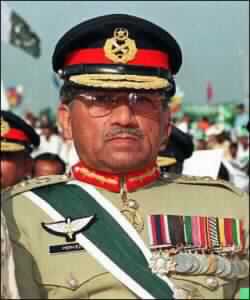- Author:
News Agencies - Section:
WORLD HEADLINES
Pakistan Won't be Bullied by India, says Musharraf

President Pervez Musharraf said Pakistan would not be bullied by India and insisted he wanted peace in the region -- but not on India's terms. Relations between the nuclear-armed rivals have thawed in the last two months, since Prime Minister Atal Bihari Vajpayee opened the door to talks over Kashmir, a Himalayan region over which they have fought two of their three wars.
But Musharraf, a general who took power in a 1999 military coup, told journalists in an interview late on Sunday he was not convinced of India's genuine commitment to peace.
"I am not 100 per cent sure," he said. "Talks should take place, they are moving very slowly, they need to move faster, they can move faster. Whether we move forward on the Kashmir issue, we will see, time will tell."
Musharraf's words appeared to throw further cold water on hopes for quick progress in easing tensions in South Asia.
In April, Vajpayee promised a final bid for peace with Pakistan in his lifetime, and both sides have since put forward confidence-building measures, including agreeing to restore full diplomatic ties.
The New Delhi government says it will not agree to start talks until Pakistan takes action to end the infiltration of Muslim fighters into Jammu and Kashmir, something Pakistan says it has already done.
"The problem with India is they are too conscious of their large size and they believe in coercing their neighbours," Musharraf said. "They want to dictate terms to us, they want to dictate their version of a solution. We will not take that."
"We will not compromise our sovereign equality," he said. "Within these parameters we want peace, we want harmony. We will take three steps if they take one, but let them not treat us like any small country around. We are a powerful nation."
He said India took every opportunity to malign Pakistan, and had tried to bully it last year by stationing hundreds of thousands of troops along the border after an attack on the Indian parliament which the New Delhi government blamed on Pakistani militants.
Earlier on Sunday, India said it was "deeply disappointed" by Musharraf's response to recent peace overtures, in particular by recent remarks he made to an Indian television channel.
In that interview, Musharraf appeared not to rule out a recurrence of clashes in 1999 in the Kargil region of Kashmir, comments New Delhi said condoned "military adventurism".
But Musharraf said he had been quoted out of context.
"They are looking for an excuse to malign us, or to target me personally," he said. "The issue is what I said. I said 'if we don't resolve this...anything can happen'."
"Why are they pinning it on me as through I am going to do something? I am not going to do anything."
"We have fought three wars in the past, so what is the guarantee in the future there won't be any further action? That is not a aggressive statement, it is a statement of fact."
Musharraf was commander-in-chief of Pakistan's armed forces when the Kargil clashes erupted in 1999, and was widely blamed for sabotaging a peace initiative at the time between Nawaz Sharif's civilian government and India.
Facing the sack over the whole episode, he later deposed Sharif in a coup.
Musharraf sets off later this week for a visit to Britain, the United States, Germany and France, crowned by a meeting with US President George W Bush on June 24.
He said he wanted the United States to put more pressure on India over Kashmir and to accept that the dispute must be resolved for peaceful progress in the region.
"Any attempts to improve relations and deal with all issues by sidelining Kashmir will not work, it has never worked in the past," he said.
Asked what role the United States could play, he said:
"Step one, start the dialogue. Step two, accept that Kashmir needs to be resolved for peace in the region.
"They are trying to do their best. Maybe they need to do more with India."
**PHOTO CAPTION***
Pakistan President Pervez Musharraf (AFP/File/Saeed Khan)


 Home
Home Discover Islam
Discover Islam Quran Recitations
Quran Recitations Lectures
Lectures
 Fatwa
Fatwa Articles
Articles Fiqh
Fiqh E-Books
E-Books Boys & Girls
Boys & Girls  Women
Women









